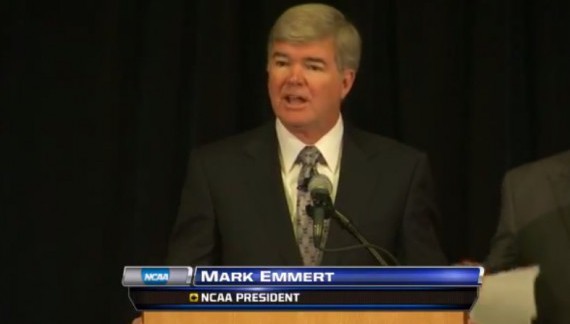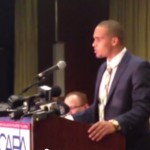With the recent ruling of the National Labor Relations Board in favor of the athletes at Northwestern, the whole order of college athletics finds itself at a tipping point unlike anything ever seen since the inception of the NCAA more than a century ago.
Currently, the vast majority of college athletes do not receive full scholarships but are still required to abide by all NCAA rules, no matter how random or inane. Those who do receive a full ride still don’t receive enough to cover the full cost of attendance – including money for incidentals and entertainment, all needed by all students – and the player’s family is expected to pick up the slack, whether or not they can find the extra cash in their budget.
This comes at a time when the business (and I do mean business) of college athletics generates more cash than ever. In 2012, the Pac-12 Conference signed a TV deal worth more than four billion dollars (about $25 million per school per year), while the SEC’s newest television deal is reported to be worth over $30 million per school each year.
During that time, according to University of Florida President Bernie Machen, all the new cash ”has been spent entirely on facilities and coaches’ salaries. The amount spent on students has not increased at all after all this additional money has gone into college sports. That’s just embarrassing.”
In a feature for “The Atlantic” in September, 2011, entitled The Shame of College Sports, Taylor Branch put it thusly:
For all the outrage, the real scandal is not that students are getting illegally paid or recruited, it’s that two of the noble principles on which the NCAA justifies its existence—“amateurism” and the “student-athlete”—are cynical hoaxes, legalistic confections propagated by the universities so they can exploit the skills and fame of young athletes. The tragedy at the heart of college sports is not that some college athletes are getting paid, but that more of them are not.
One of the ironies of this situation is that this particular legal battle was started by a group of athletes at Northwestern University, one of the few remaining places where the term “student-athlete” wasn’t being used sarcastically with air quotes whenever the topic was brought up. What you have here is a group of about 100 talented (and educated) athletes, realizing how little protection they actually have.
Kain Colter, former Wildcat QB and one of the faces of the lawsuit, has been quoted as saying he has nothing against the university, and that his time at the school had been great, but that he was “interested in trying to help all players — at USC, Stanford, Oklahoma State, everywhere. It’s about protecting them and future generations to come.”
On its website, the National Collegiate Players Association has a list of eleven goals they are pushing for, and it’s worth noting that none of the bullet points ask explicitly for athletes to be paid by the university, though Goal #8 does seek to “eliminate restrictions on legitimate employment and players’ ability to directly benefit from commercial opportunities.” Perhaps more importantly though, most of the goals focus on protecting the players’ health and academic scholarships. Another goal seeks to “prevent players from being stuck paying sports-related medical expenses.”
Now the NCAA has a problem, because its sole reason for existence is to effectively prevent college athletes from earning the kind of compensation they would be worth on the open market. Once they can no longer protect athletes from the horrors and evils of being paid, they won’t have much usefulness anymore, to this observer.
The NCAA knows this, and while President Mark Emmert is busy scurrying from interview to interview putting his best spin on things, behind closed doors at headquarters in Indianapolis, the powers that be are terrified of what’s coming next.
How do I know? Just look at the timeline of events over the past month:
- March 27 — The NLRB rules that NU football players are employees of the university and deserve all the legal rights and protections that come with that designation.
- April 6 — In an interview before the National Championship, UConn senior basketball star Shabazz Napier says he often goes to bed hungry, sparking outrage and controversy nationwide. This led to discussions in the Connecticut state government about legislation to make sure athletes are properly taken care of.
- April 16 — The NCAA approves changes to its long-standing rules on feeding athletes, stating that athletes may now receive unlimited food.
In less than a month, an absurd rule that stood for decades was abolished in response to the first real pressure the NCAA has ever seen. Hoping the stave off the inevitable, the decision-makers at the top have generously allowed the athletes – who generate hundreds of millions of dollars every year for universities across the nation — to be properly fed.
I’m not about to start applauding the NCAA for doing what it should have done years ago, and neither should you.
The tide of public opinion has turned decidedly against the anachronistic organization that controls college athletics, as evidenced by the epic fail that was the #AskEmmert hashtag on Twitter Friday Morning. The NCAA President made an appearance on ESPN Radio’s Mike and Mike in the Morning to deflect, er, I mean answer questions about the latest rule changes in college sports.
It did not go as planned — the responses included such gems as:
#AskEmmert what’s it like to rule a organization of thousands of schools and millions of student athletes using “because I said so” as logic
— Tim The HolyColorman (@PreacherManQB) April 18, 2014
#askemmert In private moments, do you ever just laugh really, really hard over some of the stuff that comes out of your mouth? @MikeAndMike
— SI_DougFarrar (@SI_DougFarrar) April 18, 2014
#askemmert hey, do you think we’re stupid, or do you really believe this stuff you say?
— Bomani Jones (@bomani_jones) April 18, 2014
I believe that the top brass at NCAA headquarters can’t be naïve enough to think that this farce of a model can go on forever, but I do believe they’re intent on milking it for as long as they can.
One way they do this is to throw out the post-apocalyptic scenarios where no one outside of Alabama and Texas can afford to keep their athletic departments afloat (Think Mad Max, but with cheerleaders and an only slightly less-likeable Nick Saban).
The reality is that regardless of whether or not college athletes are ever paid an actual salary, there needs to be great changes in the power structure and representation of the NCAA. The players who put their bodies and future at risk, especially on the football field, need to have some guarantees to insure that they won’t be saddled with the cost of taking care of themselves in case the worst happens.
There also needs to be procedures in place to deal, so that players have some recourse in the case of an abusive coach, such as former Rutgers head basketball coach Mike Rice, who was fired for abusing players over a long period of time before anything ever happened. Right now, players are effectively at the mercy of their coaches and athletic departments.
Mark Emmert has been quoted as saying that a players’ union “would blow up everything about the collegiate model of athletics.”
One can only hope.
Main photo from video.
Related Articles:
Alex Kirby (Writer and Football Analyst) worked several seasons as an assistant football coach at the high school and college levels and is the author of Speed Kills: Breaking Down the Chip Kelly Offense, now available HERE.


